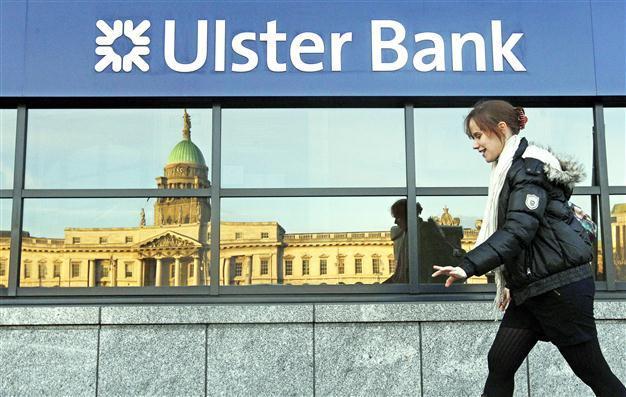EU banks struggle with big losses in Greek crisis
BRUSSELS / LONDON - Reuters

Offices of the Ulster Bank Group, a Royal Bank of Scotland unit, on the River Liffey are seen in Dublin. Losses at the London-based RBS hit 78 percent in 2011, figures say. REUTERS photo
Bailed out Franco-Belgian bank Dexia reported a 2011 net loss of 11.6 billion euros ($15.4 billion), hit by its break-up and exposure to Greek debt and other toxic assets such as U.S. mortgage-backed securities. The Greek crisis has also cut profits of many other leading European lenders.
Dexia, which accepted a state-led break-up and the nationalization of its Belgian banking arm in October, said yesterday it would not pay a dividend and also did not plan to pay a coupon on its hybrid debt.
Dexia said it suffered a 4 billion euro loss due to the disposal of Dexia Bank Belgium and a further 1 billion hit from French lending arm Dexia Municipal Agency.
It also booked a 3.4 billion euro loss on its holding of Greek sovereign bonds, while the cost of an accelerated sale of low-grade U.S. assets, carried out in the first half of the year, was 2.6 billion, Reuters reported.
In a rare item of positive news, Dexia said its assets for sale reserve was 800 million euros higher by mid-February from the end of 2011 because of a more risk-hungry market, which tightened spreads for certain sovereign issuers.
Qatar National Bank (QNB) is eyeing Denizbank, the fast-growing Turkish arm of Dexia, in a deal potentially worth up to $6 billion, people familiar with the matter told Reuters earlier this week.
Denizbank profits jumped 72 percent in its net profits last year, hitting 1.61 billion Turkish Liras. Excluding the effect of the sale of Denizbank unit Deniz Emeklilik to United States insurance giant MetLife for 162 million euros in June last year, Denizbank profits rose nearly 20 percent, according to the statement.
RBS loses bigThe Royal Bank of Scotland, which is majority-owned by the British taxpayer, saw its loss in 2011 swell by 78 percent as it booked large provisions for Greek debt.
The bank, in which the government holds an 82 percent stake, reported a worse than expected net loss of 2 billion pounds ($3.1 billion) for 2011, compared with a loss of 1.13 billion pounds the previous year. Income was down 11 percent to 26.6 billion pounds largely on the back of a 25 percent fall in revenue at the global banking and markets division.
Chairman Philip Hampton said “there are no shortcuts” to rebuilding a company saved by a 45.5 billion pound bailout, the world’s most expensive bank rescue.
Commerzbank, Germany’s second-biggest bank, also said yesterday that the eurozone debt crisis and losses on its investments in Greece slashed profits in half in 2011.
Commerzbank said in a statement its bottom-line net profit fell by 55.4 percent to 638 million euros in 2011.
Operating profit fell even more sharply, plunging 63.4 percent to 507 million euros.
“2011 was characterized for Commerzbank by a successful first six months and difficult market conditions in the second half of the year,” said chief executive Martin Blessing.
France’s Credit Agricole reported yesterday a net loss of 1.47 billion euros ($1.95 billion) last year, sending its share price plunging amid heavy falls for financial stocks.
In 2010, the bank, France’s third-biggest by market capitalization, had posted a net profit of 1.26 billion euros.
In the fourth quarter of 2011, Credit Agricole reported a loss of 3.1 billion euros, worse than the comparable loss of 328 million euros 12 months earlier. A bank statement said the group had been hit by the costs of absorbing problems associated with Greece, estimated at almost 2.4 billion euros, an adjustment plan which took effect late last year and impairment charges first announced on Dec. 14.
Credit Agricole bought the Greek Emporiki Bank in 2006 as part of an international expansion plan, but the unit has weighed on the parent company’s results in recent years.
Insurance company also hitGerman insurance giant Allianz said yesterday natural catastrophes and losses on its investments in Greece slashed its bottom-line in half in 2011.
Allianz said in a statement it had booked net profit of 2.6 billion euros ($3.4 billion) last year, a drop of 49.6 percent from a year earlier. In the fourth quarter alone, net profit fell by 56.6 percent to 492 million euros.
The decline “was mainly due to very conservative writedowns of 1.9 billion euros from Greek sovereign debt and investments, particularly in financials,” Allianz explained, according to Agence France-Presse.
